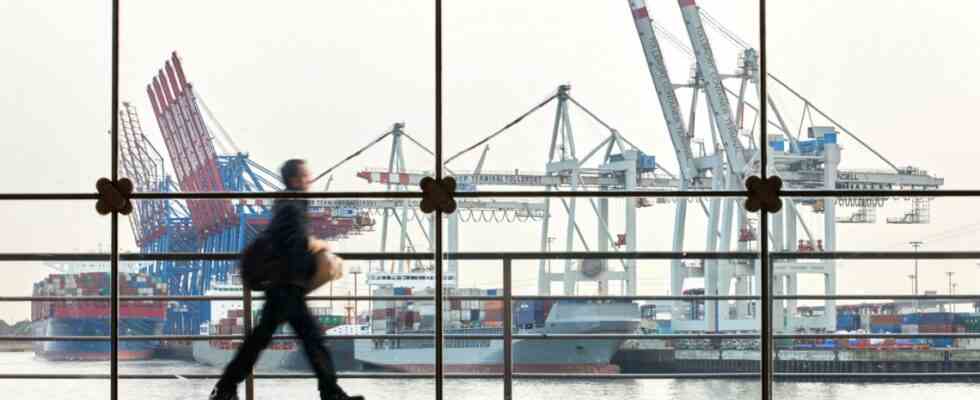A good year ago, Hamburger Hafen- und Logistik AG (HHLA) sent out a message that initially did not cause too much excitement: an agreement had been reached with the Chinese state-owned company Cosco on a stake in the Tollerort terminal in the port of Hamburg, it said. At the time, it seemed only a side note that other entities also had a say in the deal. In the meantime, however, this side note has become something big: a political issue that is becoming more and more acute.
Because according to SZ information, there is a tangible dispute within the federal government about Cosco’s request, which Chancellor Olaf Scholz (SPD) apparently does not want to end with his policy competence, but with the crowbar: although half a dozen ministries, the Federal Intelligence Service and the EU Commission are also against granting the People’s Republic access to another part of critical infrastructure in Germany, the Chancellery is apparently determined to let the deal go through. The decision should be made in the next few days, as previously reported by NDR and WDR.
China’s interest in getting involved with HHLA raises questions that go far beyond the individual case. The corona pandemic has shown how dangerous it is when a country like Germany obtains almost 100 percent of potentially vital products such as masks or medicines from a single country. This is all the more true when it comes to a country that apparently does not shy away from industrial espionage and coercion. NDR and WDR, citing German business circles, report that the Chinese embassy in Berlin has asked local companies to support Cosco in Hamburg – otherwise there would be consequences for their own business.
Scholz’s approach may also have something to do with his past
The federal government does not want to comment officially on the subject. In government circles it was only said that the vote was still ongoing. However, the Chancellery asked the Economics Ministry critically why there were concerns there.
The fact that Scholz apparently wants to push through the deal against all odds may have something to do with his past as Hamburg mayor. If the port is doing well, Hamburg is doing well too, is a saying in the Hanseatic city, after all the municipality holds 69 percent of the shares in HHLA. In 2015, while still mayor, Scholz was in China, also at Cosco’s headquarters. There were friendly talks with Li Yunpeng, the then head of the company. Why not? The shipping company’s first ship docked in Hamburg 40 years ago, and the partnership has been maintained for many years. Cosco is a group that does more than send ships around the world: it has long been involved in Europe’s largest ports, holds 35 percent of a terminal in Rotterdam and 20 percent of one in Antwerp. So to those competitors who have rushed Hamburg in container handling.
Tollerort is the smallest of four terminals in the Port of Hamburg. But with no other country do the people of Hamburg do such big business as with China. So many goods arrive from no other country, and so many are shipped to no other country. And precisely because you are in tough competition with your European neighbors, you’re welcome to add a few more containers if the deal goes through. Hamburg is hoping to become the preferred transhipment point in Europe with the Cosco participation. “A rejection of the Chinese would be a disaster not only for the port, but for Germany,” says Axel Mattern, CEO of Port of Hamburg Marketing.
However, there is criticism of Mattern’s and Scholz’ attitude not only within the government and coalition, but across all parties. The Union criticized the Chancellor’s solo effort as “questionable in terms of security and economic policy”, the left-wing faction complained that Scholz “should be aware by now that it never makes sense to sell off critical infrastructure”. More important, however, was another statement: Cosco’s entry would be “a serious mistake” because the Chinese Communist Party would then gain influence over all major EU ports, FDP Vice President Johannes Vogel tweeted. More importantly, the request to speak was immediately retweeted by party leader Christian Lindner.
The supporters of the deal rely on the time factor
On the other hand, the supporters of the Cosco deal point out that the group only wants to get involved with 35 percent in one of four terminals. A strategic influence on the plants is thus excluded. If China really wants to harm Germany, it can already steer the Cosco container ships away from Hamburg towards Antwerp or Rotterdam.
The proponents now rely on the time factor. The Foreign Trade Act stipulates that the government must raise objections to a foreign investor’s purchase offer within four months. The cabinet has the last regular opportunity to meet the deadline next Wednesday – if the Chancellery and all ministries agree. If they are not, the deal is simply concluded when the deadline expires.
After all: For Olaf Scholz, the next big trip abroad could be much more pleasant in this case. At the beginning of November, the Chancellor will fly to Beijing.

